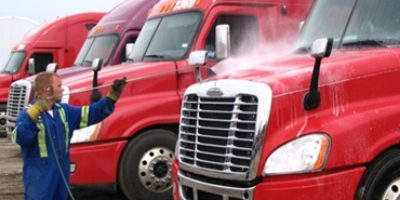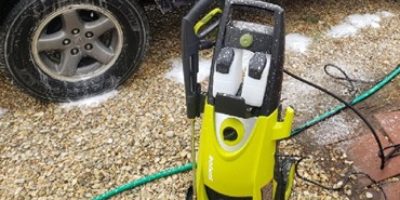Having the best gas pressure washer at your disposal is a must. People with large yards, patios, and backyards will tell you that they regret not getting a pressure washer sooner. Cleaning outside your house is never an easy task – particularly when you have a lot of muck and dirt lying around. With every round of moodiness from Mother Nature, we are left with a lot of things to clean.
It is not always the easiest task to find the best unit for your task, so make sure to go through the gas pressure washer reviews and see which model fits best. These powerful gas-guzzling machines are not toys, so choose wisely. Let’s begin.
| PRODUCT | DETAILS | ||
|---|---|---|---|
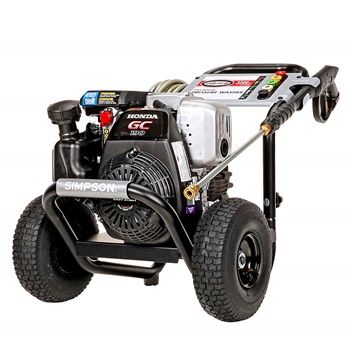 | SIMPSON Cleaning MSH3125 MegaShot Powered by Honda |
| View On Amazon |
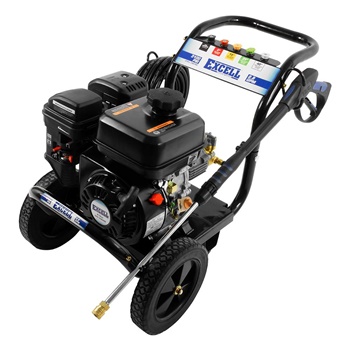 | Excell EPW2123100 Cold Water Gas Powered Pressure Washer |
| View On Amazon |
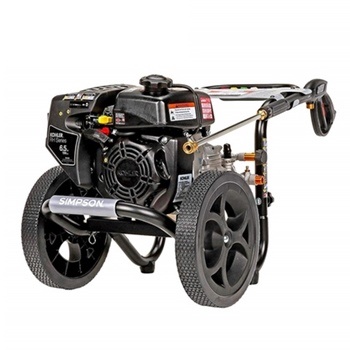 | SIMPSON Cleaning MS60763-S MegaShot Gas Pressure Washer |
| View On Amazon |
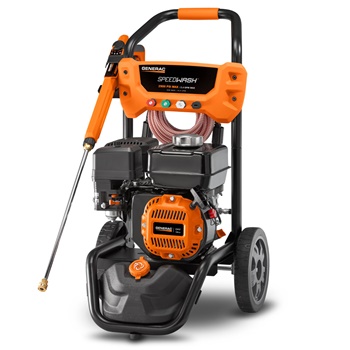 | Generac SpeedWash 7122 Gas Pressure Washer |
| View On Amazon |
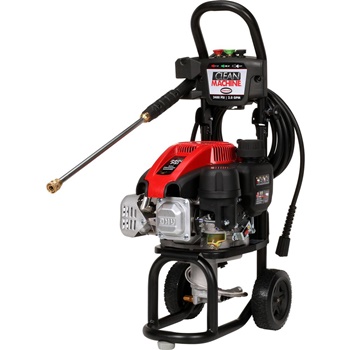 | SIMPSON Cleaning CM60912 Clean Machine Gas Pressure Washer |
| View On Amazon |
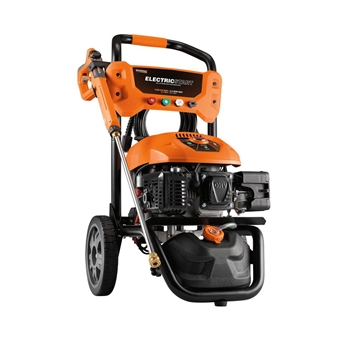 | Generac Gas Pressure Washer 3100 PSI 2.5 GPM Lithium-Ion |
| View On Amazon |
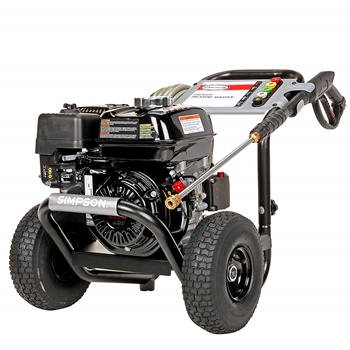 | SIMPSON Cleaning PS3228 PowerShot Gas Pressure Washer |
| View On Amazon |
7 Best Gas Pressure Washers Reviews
1. SIMPSON Cleaning MSH3125 MegaShot Powered by Honda
 This model seems to be one of the most powerful power washers not just because it is highly affordable, but also because it is very efficient in its job. With its 2.5 GPM flow rate, it can easily make your driveway look like new in less than an hour.
This model seems to be one of the most powerful power washers not just because it is highly affordable, but also because it is very efficient in its job. With its 2.5 GPM flow rate, it can easily make your driveway look like new in less than an hour.
Thanks to its relatively lightweight construction, this unit can be easily transported from one place to another. Furthermore, due to its two wheels, its portability has further increased. You may easily take it out of storage and use it for quite prolonged amounts of time.
With a motor that was designed by Honda, this unit can easily get to 3200 PSI when it reaches full throttle. This makes it perfect for tough jobs that require quite a deep cleaning.
Pros
- The unit is abrasion-resistant, making it perfect for tough jobs
- It comes with five different nozzles that can be used for a variety of circumstances
- A strong motor that can run for prolonged amounts of time
Cons
- The engine is fairly loud
- There have been complaints that the Simpson technical support is rather slow
Read more: SIMPSON Cleaning MSH3125
2. Excell EPW2123100 Cold Water Gas Powered Pressure Washer
 With its 212xx EXCELL OHV gas engine, this unit can easily be used for tough jobs around the garden. It is easy to install and carry around – and considering that it only weighs 76 pounds, it’s one of the most lightweight models of this kind that you can find. Plus, considering that gas pressure washers are usually heavy, this is quite an advantage.
With its 212xx EXCELL OHV gas engine, this unit can easily be used for tough jobs around the garden. It is easy to install and carry around – and considering that it only weighs 76 pounds, it’s one of the most lightweight models of this kind that you can find. Plus, considering that gas pressure washers are usually heavy, this is quite an advantage.
The standard warranty for this unit is 2 years, provided you get it for residential use. However, if you plan on using it for commercial purposes, the warranty goes down to only 90 days. This makes it more suitable for private houses rather than businesses and other private establishments.
With its ergonomic, rust-resistant wand and relatively long hose, you may be able to reach quite a long distance with this unit. Plus, it features 5 quick nozzle tips that you can use to wash different surfaces. Each nozzle will be suitable for a different kind of item, depending on their sensitivity.
Pros
- The product is quite affordable
- Low profile frame that is easy to store and transport
- Ergonomic design that provides versatile use
Cons
- The warranty is only 90 days for commercial use
- People have complained that the valve is not very strong
Read more: Excell EPW2123100
3. SIMPSON Cleaning MS60763-S MegaShot Gas Pressure Washer
 Simpson strikes again with a very powerful unit that can clean even the most difficult of areas. Many people prefer it thanks to its ease of use, as well as simplicity when it comes to features. If you can’t be bothered with using a complicated system, then this one should certainly be a good opportunity for you.
Simpson strikes again with a very powerful unit that can clean even the most difficult of areas. Many people prefer it thanks to its ease of use, as well as simplicity when it comes to features. If you can’t be bothered with using a complicated system, then this one should certainly be a good opportunity for you.
This unit is also maintenance-free – which is quite a feature, considering that it’s a gas device. It has safety features added as a bonus in order to protect your engine and pump. There is also a safety lock on the spray gun so that is doesn’t accidentally start spraying by itself.
With 3100 PSI and a 2.4 GPM, this gas unit is not only highly reliable, but it is also efficient in its job. Plus, thanks to its steel construction frame, it is perfect for heavy-duty use – no matter if you are buying it for commercial or residential purposes.
Pros
- It is quite easy to move around due to its lightweight construction and wheels
- Durable thanks to the steel frame
- It is versatile thanks to its 5 different nozzles
Cons
- Aside from the steel frame, the other materials seem to be of a low quality
- The engine is quite hard to start
Read more: SIMPSON Cleaning MS60763-S MegaShot
4. Generac SpeedWash 7122 Gas Pressure Washer
 Those searching for a heavy-duty power washer should look into this unit. With a 2.7 GPM and 3200 PSI, this one was designed specifically for fast and powerful cleaning, allowing you to get the job done in no time.
Those searching for a heavy-duty power washer should look into this unit. With a 2.7 GPM and 3200 PSI, this one was designed specifically for fast and powerful cleaning, allowing you to get the job done in no time.
As per the claims of Generac, it is said that this unit can clean a surface in half the time of a similar model. Plus, due to the fact that it has various versatile attachments, you may use it for a variety of items – sensitive or not. You also have a far-reaching soap blaster along with a turbo nozzle for grime and dirt and a power broom.
This unit has been equipped with a power dial, which means that you may easily switch between cleaning modes. The product was designed to be easy to use and transport – something that is further proved by the fact that it only weighs 62 pounds.
Pros
- Fairly high GPM compared to similar models
- It can clean a surface very fast
- It features a variety of handy attachments
- Durable axial pump
Cons
- You can’t use the warranty unless you adhere to maintenance rules
- Some claim that it is fairly difficult to start
Read more: Generac SpeedWash 7122
5. SIMPSON Cleaning CM60912 Clean Machine Gas Pressure Washer
 If you are looking for something relatively lightweight that was designed with convenience in mind, then this product should certainly grab your attention. Weighing only 43 pounds, this power washer has a lightweight frame that will easily allow you to move the unit from one place to another.
If you are looking for something relatively lightweight that was designed with convenience in mind, then this product should certainly grab your attention. Weighing only 43 pounds, this power washer has a lightweight frame that will easily allow you to move the unit from one place to another.
When it comes to its performance, once more, this Simpson unit does not disappoint. With a 149cc Simpson OHV engine, this power washer has large recoil and should, therefore, enable a flawless start. The engine will also deliver 2 GPM and 2400 PSI – which is perfect if you need this unit for residential use.
This unit brings a 25-foot hose that works at high pressure – meaning that you may easily spray at quite a far distance from the main tank. Plus, along with the spray gun, you get three different nozzles: a 0-degree one, a 25-degree one, and also a soap nozzle.
Pros
- It is fairly lightweight compared to other similar models
- Its compact form also allows you to save space
- The engine and pressure are perfect for cleaning relatively sensitive surfaces
Cons
- Since the unit is lightweight, it can be very hard to balance sometimes
- Some say the wheels are rather small
Read more: SIMPSON Cleaning CM60912 Clean Machine
6. Generac Gas Pressure Washer 3100 PSI 2.5 GPM Lithium-Ion
 If you are a beginner when it comes to pressure washers, then this Generac unit should certainly prove to be helpful. With a one-touch push start, this one should be up and running in just a few moments – allowing you to get the job done right away.
If you are a beginner when it comes to pressure washers, then this Generac unit should certainly prove to be helpful. With a one-touch push start, this one should be up and running in just a few moments – allowing you to get the job done right away.
This unit may be a gas pressure washer, but it also features a Lithium-Ion battery along with a charger. This battery can hold up to around 18 months worth of charge, allowing you to get the job done right away in however manner you want.
Unlike many gas pressure washers that do not allow you to modify the pressure, you can easily do it with this one. You can adjust it to four different modes – from wood to car, soap, and concrete. You can also use the four different nozzles (0-25-40 degrees, soap) to get the job done flawlessly.
Pros
- It is relatively lightweight and can easily be transported
- The pressure can be adjusted
- The engine starts quickly
- The instructions are very straightforward
Cons
- The nozzles sometimes don’t connect easily
- The hose twists easily
Read more: Generac 7132 Lithium-Ion
7. SIMPSON Cleaning PS3228 PowerShot Gas Pressure Washer
 If you are looking for something efficient and of a slightly higher power, then you might want to look into this sturdy unit. At 84 pounds, it might not be one of the most lightweight units out there – but it makes it up through its durability. It can withstand heavy use, making it perfect for both residential and commercial use.
If you are looking for something efficient and of a slightly higher power, then you might want to look into this sturdy unit. At 84 pounds, it might not be one of the most lightweight units out there – but it makes it up through its durability. It can withstand heavy use, making it perfect for both residential and commercial use.
Powered by a Honda GX200 OHV engine, this unit can easily reach 3300 PSI with a 2.5 GPM. Plus, the AAA industrial plunger features PowerBoost technology – which allows for superior pressure.
The four-ply pneumatic tires are thick and will allow you to easily transport the unit across any kind of terrain. Not only will it absorb the vibrations while it is running, but it will also make you forget that the unit is so heavy in the first place.
Pros
- The PowerBoost pressure allows for superior performance
- The pneumatic tires are efficient in absorbing shock
- Fairly low emission level
Cons
- The unit is relatively heavy
- It is quite expensive for those who are looking for low prices
Read more: SIMPSON Cleaning PS3228 PowerShot
How Do Gas Pressure Washers Work?
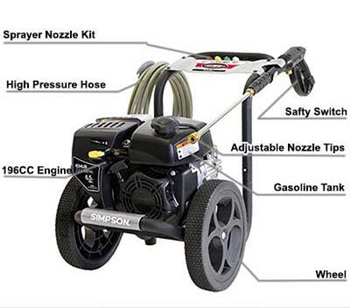 In order to understand how a gas pressure washer works, you first need to understand how a pressure washer works in general.
In order to understand how a gas pressure washer works, you first need to understand how a pressure washer works in general.
To put it simply, a pressure washer (or a power washer, as it is often called) is one part garden hose, one part air compressor. Each typical washer will work on two types of fuel: a gas-engine or an electric motor. Obviously, a gas pressure washer will be fueled by gas.
Each gas pressure washer will have a pump that will accelerate the water, which is supplied from a garden hose. As a result, this will produce high pressure. Pressure washers are also hooked to their own pressure-rated hose. At the tip of the hose, you will find a pressure gun that will look slightly similar to those you can normally see at a car wash. This is why these units are so popular when it comes to car washing.
When the trigger of the pressure gun is pulled, the water will then mix with the air and be released through the nozzle. The unit will aggressively use power jets to “blast things clean,” offering around 75 times the pressure of your average garden hose.
When choosing a pressure washer that is best suited for your purposes, there are two aspects that you might want to keep in mind: the PSI and the GPM. Generally speaking, the cleaning performance will depend on how high these numbers are – the higher they can go, the better (if you want to clean fast). You can find out more about these two terms by visiting our home page – but in summary, here is what you should know.
- PSI – Abbreviated from pounds per square inch, this will measure the water pressure at the output. It is what gives you the necessary power to penetrate through grime and dirt.
- GPM – Abbreviated from gallons per minute, this will measure the water flow that is being delivered into the spray gun. It will also give you the power to break down the dirt and wash it away using water quantity.
Depending on what you have to clean, you can easily adjust the pressure for this kind of unit as well. This way, if you have an item that needs some gentle spraying – from a rug to a concrete pathway – you can adjust that pressure to your liking.
Do Pressure Washers Use Regular Gas?
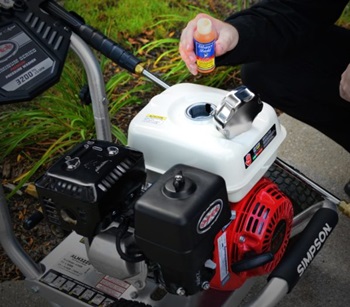 This will mostly depend on the pressure washer that you are using. For instance, yes, there are some pressure washers that will use regular gas to work. These pressure washers are among the least complicated ones, which is why they tend to be less expensive.
This will mostly depend on the pressure washer that you are using. For instance, yes, there are some pressure washers that will use regular gas to work. These pressure washers are among the least complicated ones, which is why they tend to be less expensive.
Still, other gas pressure washers may need a two-cycle mix – which is why you need to read the instructions carefully. If you use it wrongly, you risk damage to the unit and you might also injure yourself.
You may also come across gas pressure washers that work based on a mixture of oil and gasoline. Once more, in this case, you have to be careful when you read the instructions. If you do not use the right products – or you do, but mix them the wrong way – there is a high chance that you will end up damaging your engine.
In the end, while you may find gas power washers that will use regular gasoline or diesel fuel, some of them will have slightly more pretentious requirements. You must be careful to follow every step correctly and respect the fuel requirements. Otherwise, you might end up damaging the motor beyond repair.
Are Gas Pressure Washers Better Than Electric Ones?
The answer to that will depend on the purpose you have for the power washer. For example, some people believe that a gas pressure washer is one of the best things that they could go for, whereas others believe that top rated electric pressure washers are among the most convenient ones.
To determine which product is the better option for you, we will take a closer look at their features and see which one performs best in each category.
Granted, some models are better; after all, you are paying more for a reason. However, a higher price does not automatically translate into better quality. Look at the bigger picture and the overall performance to determine if a device is good for you or not.
1. Build Quality and Design
When it comes to differences between gas pressure washers and electric models, we must mention their design and build quality. Most of the time, you will see manufacturers using high-quality builds for gas units – but this is something that will come at a cost.
This usually happens because gas power washers are intended for commercial use, whereas electric models are generally used for residential purposes. While not every electric washer will receive bad reviews based on their build quality, there are various customers that complain about their durability. If you intend to use one for commercial cleaning, then you might find that it is relatively risky to use.
2. Cleaning Power
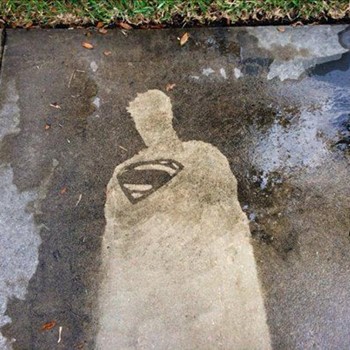 With pressure washers, it can be relatively difficult to work out the cleaning power of the unit. You need to consider the GPM, the PSI – and these two multiplied will lead to your Cleaning Unit (CU). The higher the CU will be, the faster you will be able to get the cleaning done.
With pressure washers, it can be relatively difficult to work out the cleaning power of the unit. You need to consider the GPM, the PSI – and these two multiplied will lead to your Cleaning Unit (CU). The higher the CU will be, the faster you will be able to get the cleaning done.
When it comes to electric devices, the average PSI stands between 1,300 and 1,700 – although you may find units that can go slightly higher than that. As for the GPM, it is usually between 1.4 and 1.5 – which is why the CU for electric units is typically between 5,000 and 10,000 CU.
However, the situation changes with gas devices. With these units, the GPM can go anywhere from 2.5 to 4, whereas the PSI can range anywhere from 2,000 to 4,000. This will result in a much more efficient cleaning, which can be essential if the pressure washer is used on a regular basis.
In the end, when it comes to cleaning power, there isn’t any discussion here. Gas units are hands-down more efficient and faster when it comes to their power and can handle greater amounts of grime. They also have superior parts, which is why their performance is top-notch.
3. Weight and Size
Perhaps the only thing that is quite problematic about gas pressure washers is the fact that they are very heavy. Since they were made for heavy-duty work, the frame they stand on is also sturdy. Plus, most gas units will use heavy-duty tires, which will make them all the more difficult to carry around.
On the other hand, an electric unit will weigh much less compared to a gas one – and in most cases, it is compact. Generally speaking, you should be able to carry it manually from point to another, without any worries.
However, the problem is that for this compact frame, the power had to be sacrificed. When it comes to space-saving, you could say that electric units are winners here – but that only applies marginally. If you are looking for something that will offer you a decent amount of power, then an electric model might not be of much use.
4. The Overall Winner
It can’t be easily determined electric or gas pressure washers work best for you. When it comes to the cleaning rating, gas pressure washers are hands-down the most efficient. They do require gasoline upkeep – and depending on the model, they may be relatively difficult to carry around from one place to another.
As opposed to gasoline models, an electric unit is more lightweight and is, most of the time, less expensive than its counterpart. Still, the problem is that their build quality is fairly cheap – and they also provide a smaller cleaning power. This is why, if you are looking for something efficient and of better quality, then you might want to go for a gas model. In most cases, it has proven to be more durable.
How Long Do Gas Pressure Washers Last?
This will mostly depend on the quality of the unit that you are purchasing – but in most cases, the warranty is between 1 and 3 years for devices working on gas. This will also depend on the piece that the warranty covers – most of the time, it’s broken down in engine and pump.
The engine will usually last longer than the pump – going from 300 to 3,000 hours on average. This is why it also gets a fairly lengthy warranty. In most cases, the warranty for the engine will be for about 2 to 3 years or more, depending on the unit. The pump, on the other hand, is not as long-lived as the motor, which is why it offers only around a 1-2-year warranty.
However, this does not mean that the unit will break down after 2-3 years of use. Most of the time, it can function perfectly for years with proper maintenance and avoiding common mistakes that gas pressure washer owners make. A gas unit with high-quality components can last for as much as 8 years – provided you change the oil at the right time or maybe replace the stock pump. Gas pressure washers are long-lived – so, if you maintain them properly, then there is a high chance that you will have them for a fairly long time.
No matter if you are a professional worker or not, you should invest in your pressure washer tools. You don’t have to spend entire fortunes on the unit – but you do not want to get the cheapest options either. If you want quality (and for your units to last quite some time), then the investment is worth it.
Gas Powered Pressure Washer Buying Guide
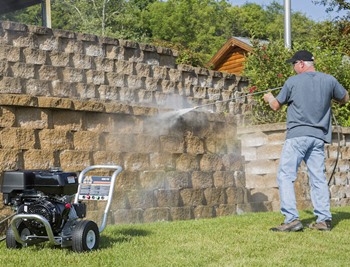 Before buying a gas pressure washer, there are several things that you might want to consider. In hindsight, these might seem unimportant – but in truth, they may make the difference between money well-spent and a washer that is left lying around in the garage. Here are some factors that you might want to keep in mind.
Before buying a gas pressure washer, there are several things that you might want to consider. In hindsight, these might seem unimportant – but in truth, they may make the difference between money well-spent and a washer that is left lying around in the garage. Here are some factors that you might want to keep in mind.
1. Terrain
Where exactly are you planning on using the pressure washer? Do you want to keep it on even, accessible grounds – or is your plan to take it in less accessible terrain? Bear in mind that a low-profile pressure washer might not be a solution for a rough terrain– which is why you will need something with a strong frame.
Look for welded frames that can protect the pump and engine from any potential damage. You might also want to look for shock-absorbent designs, particularly if the terrain is very bumpy.
2. Water Pressure Strength
How powerful do you want your gas pressure washer to be? Do you want something with a lower pressure, or do you need the pressure to be higher? Generally speaking, if you want to get the job done quickly, you should go for something with a higher pressure – but only if you are certain that the object in the cause can handle that kind of pressure.
For instance, if you are planning to use the gas pressure washer to clean up a carpet, you will not need more than 300 PSI to get the job done. Similarly, it might be rather dangerous to use a high PSI on a painted wood fence, as it might chip off the paint.
This is why you should ensure that you purchase the proper unit with the right water pressure. Gas units can generally reach high-pressure levels, which is why you should look for something that may be easily adjusted.
3. Starter Method
Depending on the gas pressure washer, you might come across two kinds of starters: an electric starter or recoil ones (the pull-string type). Electric starters are generally recommended for washers that have a big engine – making them the much safer alternative.
An electric starter will also allow you to start the unit on by simply pushing a button. However, bear in mind that these are more expensive than recoil units, which use “traditional methods.”
4. Water Temperature
Depending on the type of dirt that you have to deal with, you might want to choose between a hot water pressure unit and a cold water pressure one. The ones working only with cold water are the least expensive option, but a hot water device might prove to be more useful in certain circumstances.
For example, while cold water might be very efficient in removing simple dirt such as dust, mud (wet and dried), or other similar types of stains, it may not be as efficient in removing oily stains and grime. Oil breaks down only under high temperatures – so, unless the water has been at least heated up at 50 degrees Celsius, it may not be helpful in eliminating all the dirt.
5. Portability
How easy is it for you to move the unit from one place to another? Depending on the weight of the unit, you may or may not be able to move it even across the backyard. By nature, gas pressure washers are heavier when compared to electric models – but some manufacturers have tried to optimize them and make them lightweight so that they can be used as top-rated portable pressure washers.
If a unit is particularly heavy but seems to be efficient for the purposes that you have in mind, make sure that it has at least been equipped with wheels. These will allow you to transport the washer, without having to continuously carry it by a handle.
6. Warranty
Needless to say, the bigger the warranty is for a gas pressure washer, the better. Bear in mind that when it comes to these units, the warranty is broken down into two different categories: the warranty for the pump, and the warranty for the engine. The engine generally has a longer warranty compared to the pump, which is why you need to be aware of the differences.
7. Ease of Use
How easy is the unit to use? Is the setup straightforward, or do you have to go through countless complicated steps in order to get it started? Technically speaking, gas pressure washers are easy to use. However, since they are very powerful, they should be used by people who are in good health.
The only disadvantage when it comes to gas-powered units is that they require quite a lot of maintenance compared to electric ones. For instance, while an electric model will barely require any maintenance, an electric model will have you changing oil, draining it, and filling the fuel tank.
How to Set Up a Gas Pressure Washer
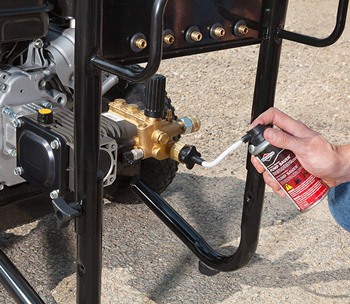 Setting up a pressure washer is relatively easy to do – even if you are a beginner in this regard. Even if gas power washers deliver more power than electric units, they are not as difficult to set up. However, you must ensure that you set it up properly – checking all the fittings and protecting your motor. This will ensure the durability and safety of the washer.
Setting up a pressure washer is relatively easy to do – even if you are a beginner in this regard. Even if gas power washers deliver more power than electric units, they are not as difficult to set up. However, you must ensure that you set it up properly – checking all the fittings and protecting your motor. This will ensure the durability and safety of the washer.
If you are a complete beginner when it comes to setting up a gas power washer, here is what you will have to do.
1. Check the Oil Tank
Before you start the power washer, safety dictates that you always check the unit’s oil tank. Simply remove the dipstick and see where the oil level is at. If the level seems low, you might want to add more oil. However, make sure that you don’t overfill the crankcase of the engine, as this might do more damage than it does good. Also, make sure that the gasoline that you are using is unleaded.
2. Fill the Fuel Tank
The next step here is to fill the fuel tank. You need to check the requirements of the machine first, to see if it requires gasoline, diesel fuel, or any other type of fuel. While it might not seem important right now, the wrong kind of fuel can damage your engine – which is obviously not a good thing for your gas pressure washer.
3. Set the Spray Gun
Once you have added the oil, the next step would be to set the spray gun. First things first, you should take the extension wand and attach it to the spray gun. Tighten it until you know for certain it won’t unscrew itself. Make sure that you also choose the right nozzle for the item that you are planning to pressure clean.
4. Set the Hose
You have set up the spray gun. At this point, the next step would be to set up the unit’s high-pressure hose. One end of the hose should go into the high-pressure inlet of the pressure washer, whereas the other end should go into the spray hose. Make sure that you tighten every connection properly, to avoid any unfortunate incidents.
5. Connect to Water Source
It’s called a “washer” – so obviously, you will need water to get this machine going. Before you attach the washer to the water source, you might want to perform a test. Start the spigot that is attached to the garden hose, and let the water flow until it is clean. Garden water tends to be dirty when you first turn it on – and since debris can damage your unit, you first have to make sure that it is clear.
Once you have determined that the water is good for use, turn off the source. Take a coupler and then tread it on your garden hose. After that, attach the hose to the inlet, tightening the coupler.
6. Start the Engine
Depending on the model that you are using, you may have to use a primer bulb or a choke to the carburetor – after which you will have to pull the start cord. You must adjust the throttle to a suitable speed to run the motor. At that point, the spray gun will be functioning at full force, and will automatically go on pause when the trigger is released.
FAQ About Gas Power Washers
1. Do gas pressure washers need a special kind of soap?
Not necessarily. Granted, there are various types of soaps that have been particularly made for pressure washers – but there is hardly any difference between them. However, you should steer towards the more natural soaps and detergents that are less likely to damage your unit. For instance, soaps that also use harsh chemicals such as bleach are not that suitable to be used on a pressure washer, since they may corrode through the components.
2. Can I use my gas pressure washer in the rain?
Generally speaking, yes, you should be able to use your gas pressure washer in the rain. The only problem is posed by electric units, which are connected to an electric source. In that case, if you use the power washer in the rain, then you are putting yourself in danger of electrocution.
That being said, not every gas pressure washer can be used in the rain either. It will depend on its UL rating in regards to equipment safety. Look for products that have successfully passed the erosion test, as well as the ones for wet-environment use. Still, you should handle this with caution – particularly if you are an inexperienced user.
3. What happens if I put diesel fuel in a gasoline pressure washer?
Ideally, you should only use a particular kind of fuel that has been recommended for your unit. For example, if your engine runs on gas, then you should not add diesel fuel in it. Diesel fuel is considerably thicker compared to gas, and it might jam the fuel injectors of your engine – as well as its lines and filters.
Plus, considering that gas engines don’t usually give off the same heat and pressure, your engine won’t be able to correctly combust. This may not only cause cylinder problems, but also timing issues. The gas pressure washer might work for a short time, but it will slow in performance until it eventually stops working.
4. Do I need hearing protection when handling gas pressure washers?
A gas pressure washer will generally produce around 85 dBA – a threshold at which it is usually recommended to wear hearing protection. The average electric model will produce around 75 dBA – which will not be harmful to your hearing and will not require any hearing protection. This is why it is recommended that you wear both safety glasses and hearing protection whenever you are handling gas pressure washers. If you don’t have the knowledge of decibel ratings, you can check this noise source comparison.
Sum Up
Gas pressure washers are the perfect units to have around the home when you have some express cleaning to do. We’re talking about the type of cleaning that you know for certain your regular garden hose can’t handle. In this case, you’ll want the best gas pressure washer to get rid of all the grime and muck.
Hopefully, our gas pressure washer reviews have proven helpful in steering you in the right direction. Most units are great for both residential and commercial use.
